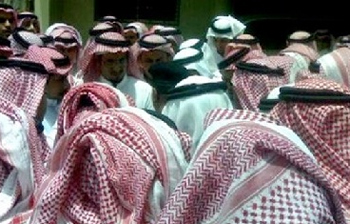 Jeddah, Dec 6: Jobless young Saudis have called on the Ministry of Labor to increase Nitaqat quotas at private firms and fill positions left vacant by departing illegal workers to solve the country's unemployment problem.
Jeddah, Dec 6: Jobless young Saudis have called on the Ministry of Labor to increase Nitaqat quotas at private firms and fill positions left vacant by departing illegal workers to solve the country's unemployment problem.
This comes as Minister of Labor Adel Fakeih recently announced that 250,000 Saudis have found jobs because of the rectification process.
A survey conducted by Arab News showed that many Saudis want the quotas increased, with some seeing positive signs that companies are employing more citizens.
“I've observed a noticeable rise in the number of companies looking for Saudi workers since the Labor Ministry introduced the Nitaqat program and the rectification campaign currently being implemented in collaboration with the Ministry of Interior,” Abdullah Al-Qadi, a citizen, told Arab News.
“We expect the ministry to raise the Saudization quotas in industries such as construction and contracting where very few Saudis are working even though there are huge projects under way. The contracting companies can appoint Saudis in administrative posts,” Al-Qadi said.
Another Saudi, Yusuf Sadiq, urged private companies to cooperate with the ministry by not appointing more expatriates. “Such patriotic acts will be more profitable for employers and the country. It will reduce the unemployment rate considerably,” he said.
He urged the government to provide more training and rehabilitation programs for young Saudis.
Nasser Al-Saedi, a citizen, said large companies were not helping to reduce the unemployment rate despite the government offering them massive contracts with huge concessions and incentives.
He said a tax should be imposed on expatriates for using the country's subsidized petrol and commodities. “It is logical to impose a levy on the subsidized services enjoyed by expatriate workers,” he said.
Asim Al-Masari said that expatriates have had easy access to the country's top jobs, creating the incorrect perception that Saudis are not qualified to take up these positions. He also urged the government to provide more training for Saudis because this would benefit companies and the country.
According to the Nitaqat program, the agriculture sector should have 27 percent Saudi staff, and banks 90 percent Saudis, especially if the company employs more than 3,000 workers. Crude oil production and the gas sector should have a Saudization rate of 85 percent.
Downstream industries with more than 3,000 workers should appoint 35 percent Saudis, the telecommunications sector 75 percent, the petrochemical sector 80 percent, printing and publishing 65 percent, information technology 45 percent and schools for boys 40 percent.






Comments
Add new comment